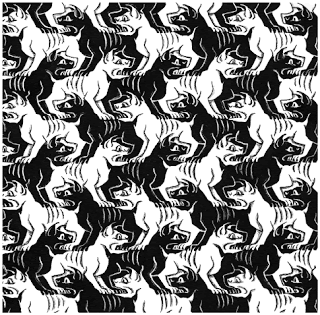This means a pattern of identical shapes that all fit together perfectly without any gaps or overlapping. If you do inlay or put small tiles together in this way, you are tessellating. The word came from the Latin tesselltus, which means "of small square stones." And tesselltus came from tessella, meaning "small cube."
 |
| A tessellation of white dogs and black dogs by M.C. Escher |
BOOTLESS
If you are shoeless, it means you have no shoes, but bootless can mean more than just not having boots. Because if something is bootless, it means that it is of little use, futile, fruitless, or unprofitable. Bootless came from the Old English word botleas, based on bot, meaning "compensation." And in Old Norse, there was a similar word, botalauss.
While I was learning about bootless, I found out there was another word about clothing that is missing, and it is the word sleeveless. Of course, this word means "without sleeves," but it can also mean the same thing as bootless, if you use it to describe something that is unprofitable or futile.
 |
| Statue of Lorelei |
This is the name of a mystical German water creature, and the way you pronounce it is LORE-RAH-LIE. In German legend, Lorelei was like the sirens of Greek mythology that lured sailors to their deaths. Lorelei liked to sit on a huge rock on the east bank of the Rhine River south of Koblenz. This rock is at the narrowest part of the river between Switzerland and the North Sea. It is a very dangerous place because of the strong currents and the rocks below the surface of the water. So lots of boats have had wrecks there.
 |
| Lorelei Rock |
 |
| Map of earthquake zones |
A brontide is a low rumbling sound that is probably caused by weak earth tremors. People who live in places where there is a lot of seismic activity might hear brontides. I'm sure that dogs hear them more than humans do because of their superior sense of hearing.
 |
| Dogs can get in a swivet, too! |
If you are in a swivet, you are very agitated. And also, you might feel distressed, panicked, excited, nervous, or all a-flutter. This word has been around since at least 1892, but nobody remembers where it came from.


















0 comments:
Post a Comment